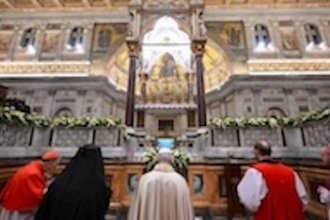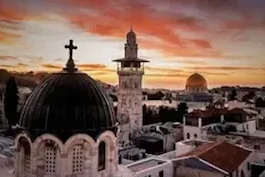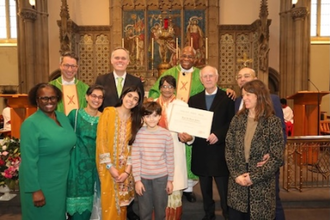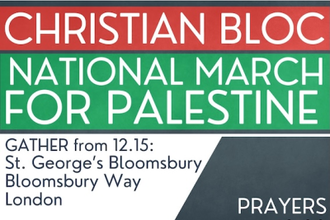Text: Fr Wilton-Morgan at Week of Prayer for Christian Unity Ecumenical Service
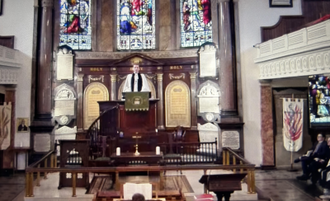
ICN Screenshot
Fr Edwin Wilton-Morgan - Assistant Priest, St Giles' Cripplegate, gave the following homily on 18 January at Wesley's Chapel & Leysian Mission at the Ecumenical Service celebrating the Week of Prayer for Christian Unity.
Psalm 138; 1 Corinthians 13; Luke 10.25-37
In the Name of the Father, and of the Son, and of the Holy Spirit. Amen.
During last year's Week of Prayer for Christian Unity, two things happened to me in quick succession.
The first was a complete lack of charity on my part: after a service of Evensong at the cathedral where I worked, a rather militant visitor came up to me, said what a beautiful service it was, and what a pity it was that 'you Anglicans' were so rubbish at ecumenical dialogue. I wasn't quite sure how to respond to this, so I made some non-committal pastoral noises. Then she got a bit louder and complained that 'you Anglicans' had shut the door on unification with her particular denomination because of various stupid decisions that we had made, which she recounted at length rather aggressively. I was a little annoyed by this and slightly archly suggested that, given that dialogue went both ways, perhaps the door had in some way also been shut from the other side. This was a foolish thing to say, and it was met with her bellowing 'ONLY BECAUSE YOU SHUT IT FIRST.' I retired to the vestry feeling rather cross, and convinced of the undesirability of unity with that particular Christian.
The second event happened to me only a few days later. I had spent a few days on a placement in a primary school, and on my final day I was escorting a little girl to the school gates to be collected by her parents. En route, she said, 'You know, Father Edwin, some kids here are not very nice to each other because of their religion. They say that they're wrong or that their religion is mythical. That's not very kind. Like I'm a Muslim, and you're a Christian. It doesn't matter what you believe or who's right, we should treat each other with respect and love.' As I watched her run off to her parents, I thought back to how little respect and love that Christian lady and I had shown each other, and how a nine-year-old Muslim girl understood Christian charity better than I. Out of the mouths of babes.
When it comes to the business of Christian unity, I think it can be so tempting to look in the wrong direction. Because disunity is a human problem, we see it must consequently have a human solution. And so, rather than looking to Christ, we look at each other. We look at each other and think 'I'm like this and you're like that so one of must be wrong; either I need to become like you or more likely you need to become like me.' This, of course, is where that lady and I both went wrong, each side blaming the other for the problem of disunity without seeing the irony. Perceiving that there's no division in the Body of Christ, it can be tempting to think that the distinctions between believers are something to be regretted, and to be conquered. In other words, the temptation is to conflate unity with uniformity.
In a few moments' time, we'll hear that great hymn to love from 1 Corinthians 13, a hymn that's written with some urgency to a greatly divided Christian community, where even the celebration of the Eucharist has become a point of division between the rich and the poor. Yet, as we hear in the chapter before this, chapter 12, St Paul's advice is not to homogenise this community, not to sweep aside individuality, but to celebrate the diversity of the members of the Body of Christ. 'As it is,' he says, 'God arranged the members in the body, each one of them, as he chose. If all were a single member, where would the body be?' It is precisely in your diversity, he is saying, that you form the Body of Christ. Each of you individuals is individually loved, and so joined to one another and to Christ, the head. Stop looking at each other, and look at Christ. Or to change the image slightly, the Church Fathers gave us the example of a spoked wheel. Each of us spokes might feel the division between us and our neighbouring spokes, and forget to look at the centre of the wheel, which is Christ. And a wheel with only one spoke is a fairly rubbish wheel. St Paul tells us, diversity does not mean division.
I think the risks of confusing unity and uniformity are manifold. First, it can lead to a bitter and cynical faith. If we proudly take on the task of uniting Christ's Church ourselves, without bringing him into the conversation, if we hang our entire faith solely on the necessity of singular church polity, then we will inevitably be defeated. 'See how these Christians love one another' we might say bitterly, forgetting that love does not mean agreement. And second, an absolute insistence on uniformity leads, as St Paul knew, to a church that belongs to the powerful, with no room for the marginalised or dissenting. 'The members of the body that seem to be weaker,' he says, 'are indispensable.' The strength of the Body depends on its diversity. A uniform church, a church that insists upon a doctrinal, ecclesial and liturgical monoculture, is one that forgets that Christ came to us as an outsider, a dissenting voice, a weak member.
I think something of this sits at the heart of Christ's Parable of the Good Samaritan, around which much of our service today is shaped. Christ deliberately chooses a Samaritan for his story, someone from a different cult, whose beliefs would have been deemed wrong by Jesus' audience. And he does so primarily to remind his followers that true neighbourliness, true Christlikeness is not about the doctrinal uniformity of mind, but about a deeper charitable unity of heart. And, secondly, to remind his listeners that God's love and will and activity are often most chiefly known in those society and institutions may wish to 'other' or to silence. Christ's command to 'go and do likewise' I think challenges us to a more generous understanding of love and unity, one that doesn't trample and squish and conform others, but one in which disagreement can in fact deepen our love and our unity.
One of my favourite passages in Scripture comes earlier in Luke's Gospel, when Christ stands up in the synagogue and reads from the scroll. In that moment, when he reads that great prophecy of Isaiah, when he tells the gathered congregation about the proclamation of good news to the poor, the captive, the blind, the oppressed, when with the eyes of all upon him he says, 'Today this scripture has been fulfilled in your hearing,' he declares the manifesto of the new community he is establishing in himself. A community in which all are welcome, a community composed of the strong and the weak, a community that is broad enough to encompass differences in belief, allegiance and practice, a community of many members, but one head. This is the Church, expressing itself in a myriad of ways, places, and institutions, but made one in Christ, in whom we now live and move and have our being. The quest for unity is as simple, and as challenging, as looking to Christ, the pioneer and perfecter of our faltering faith.
'For just as the body is one and has many members, and all the members of the body, though many, are one body, so it is with Christ. For in the one Spirit we were all baptized into one body-Jews or Greeks, slaves or free - and we were all made to drink of one Spirit.' We are the one, holy, catholic, and apostolic Church: diverse, but united. Amen.
Watch the service here: www.youtube.com/watch?v=msE1rO-Ct_I




